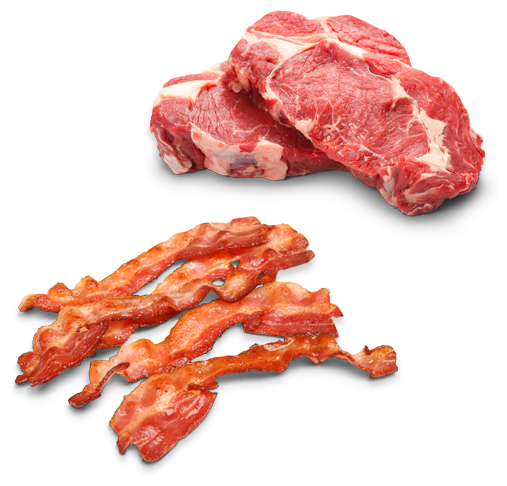Eat no more than moderate amounts of red meat, such as beef, pork, and lamb. Eat little, if any, processed meat.
You don’t have to eat red meat to get the nutrients you need, but eating moderate amounts provides a good source of protein, iron, zinc, and vitamin B12. However, eating more than 18 oz. of red meat weekly can increase your cancer risk. If you eat red meat, limit the consumption to no more than 3 portions a week or about 12-18 ounces (cooked). Eat little, if any, processed meat.
Reduce your consumption.
Think of lean meat as a side dish.
In your blueprint to beat cancer, it helps to think of animal proteins like fish, poultry, and lean red meat as a complement to your mostly plant-based meals. Load your plate with greens and grains, and let meat be a secondary focus of your meal.
Go meatless now and then.
Don’t feel like every meal you make has to include meat. Have fun exploring plant-based recipes, and enjoy some lunches and dinners that are entirely plant-based. The next time you make chili, for instance, consider adding extra kidney beans in place of ground beef. You’ll save money and enjoy a flavorful dish that lowers your cancer risk.
Load up on the good stuff.
Remember, no matter what type of meat you eat, plant-based foods should make up two thirds (or more!) of any meal, while one third or less should be made up of animal proteins such as seafood, poultry and dairy foods and occasionally lean and red meat.
Skip the processed meats.
Processed meats have been smoked, cured, salted, fermented or had preservatives added to them. Instead of eating hot dogs, bacon, sausage and deli meats, go for fresh roasted poultry, nut butters, hummus, and other bean spreads for sandwiches and other dining options.
Research suggests that eating more than 12 to 18 ounces per week of red meat increases risk of colorectal cancer.
Studies show that putting a lot of red meat on your plate often crowds out whole grains, vegetables, fruits, beans and other plant-based foods that can prevent cancer.
How much lean red meat fits into a healthy diet?
A combination of three moderate portions of 4 to 6 ounces of cooked red meat comes out to 12 to 18 ounces weekly. A moderate portion of meat equals 1 to 2 decks of cards. When you prepare lean hamburger, steak, pork roast, or lamb chops keep in mind that meat shrinks as it cooks. Use this rule of thumb, a 4 ounce uncooked portion shrinks to 3 ounces cooked.
What about processed meat?
Processed meat contains high amounts of saturated fat, salt, and chemical additives. Eating processed meat regularly can lead to weight gain, and can put you at increased risk for colorectal cancer. Most of the time, it’s best to stay away from processed meat like ham, hot dogs, deli cuts, bacon, and sausages (including sausage and bacon made from chicken and turkey).
Processed meat is high in heme iron. In addition, some of the preservation methods used in producing processed meat (which include smoking, curing and salting, and the addition of chemical preservatives) have been shown to cause cancer in laboratory studies.

Check In With Your Health
The choices we make each day can help reduce our risk of cancer.
AICR's new Cancer Health Check will help you learn more about your
choices and how you can stack the odds in your favor.






